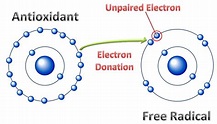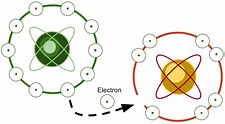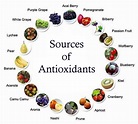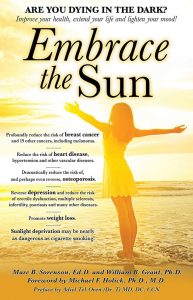Antioxidants: power against skin cancer. Marc Sorenson, EdD
Antioxidants can quench (eliminate) free radicals.
Antioxidants are popular as supplements, and they are found many foods, but especially in fruits and vegetables. Because they are critical to good nutrition, let’s first consider what they do to a prevent cancer. First of all, what are they? They are substances that eliminate free-radical atoms and molecules. These radicals are formed by combining oxygen with stable atoms, hence the term “oxidation.” Therefore, we must also understand the free radical in order to understand the antioxidant’s importance.
Antioxidants and the notorious free radical 
A free radical is a highly unstable atom capable of independent existence and having at least one unpaired electron in its outer shell.[1] So, when an atom loses an electron, it becomes unstable in an attempt to reestablish balance. Because this atom “craves” to have its balance restored, it will “steal” an electron from another atom to achieve stability. Therefore, the atom from which the electron is stolen becomes another free radical. The first atom now becomes stable because it has snatched an electron. Consequently, however, the atom from which the electron is snatched becomes another free radical.
So this process repeats innumerable times.[2] And this chain reaction cannot cease until another substance, with an extra electron to “give away,” steps in. That substance finally furnishes the electron that produces stability. That substance, of course, is an antioxidant.  Thus, antioxidants can furnish electrons to stabilize free radicals without causing damage. Hence, they are like the hero who gives his life for the team and then passes on.
Thus, antioxidants can furnish electrons to stabilize free radicals without causing damage. Hence, they are like the hero who gives his life for the team and then passes on.
Oxygen in free-radical formation
As mentioned, the process of free-radical formation is known as oxidation, because free radicals are usually formed due to oxygen molecules, which are unstable. This is possible because oxygen easily combines with other substances. Oxygen gives us life, but its byproducts, if not controlled, can quickly end life. As an iron pipe rusts, it is because it succumbing to the free-radical attack of oxidation. When anything burns, free radicals form. Due to oxidation, a single cigarette creates about one quadrillion free-radical attacks.[3] Cooking creates massive quantities of free radicals. Breathing, heart beat and exercise also create oxidation. It is most noteworthy to understand that without antioxidants, our metabolic processes would shortly kill us because of oxidation.
Antioxidants and skin cancer
Oxidation damages DNA, and unchecked, it causes cancer. Therefore, the fact that smoking kills so many people attests to an obvious reality. Because smokers have insufficient levels of antioxidants to handle the free-radical load, they succumb to cancer. In fact, smoking is a major cause of non-melanoma skin cancers (NMSC); the greater the number of cigarettes smoked, the greater is the risk of skin cancer.[4] So, how important are antioxidants to cancer prevention, especially non-melanoma skin cancer? The research on antioxidants and skin cancer expatiates on this subject.[5]
More important research on antioxidants and Basal Cell Carcinoma (BCC)
The research just mentioned tells us that NMSC accounts for more that half of all diagnoses of cancer. And basal cell skin cancer (BCC) accounts for 70-80% of skin tumors. So, the researchers set out to determine the influence of antioxidants on NMSC. They tested 84 individuals and divided them into two groups: 1. a control group of healthy people, and 2. a case group of those who were undergoing surgery for BCC. In addition, they measured the blood of each group for free-radical markers, and then they compared the two groups. Also, they assessed the usual dietary intake of the subjects. As a result they discovered that the case group had significantly higher markers of oxidative stress compared with controls. While these results were impressive, there were other interesting results:
Other results regarding antioxidants
- Especially relevant was that antioxidants from foods were more pronounced in the control group. It seems like antioxidants from food must have been protective against BCC. Why? Because the intake of foods containing antioxidants showed their influence in reducing oxidative stress. Most of all, vitamins A and E were more prevalent among the non-diseased subjects.
- Also, the dietary concentrations of antioxidants minerals such as zinc, copper and selenium in the case group were significantly lower than healthy controls.
The power of fruits and veggies. 
Vegetables and fruits rich in antioxidants are protective against various diseases. We know this due to a plethora of research and observations. This research adds more information indicating that we should stop blaming the sun for skin cancer and clean up our diets. See sunlightinstitute.org for more information on skin cancer and nutrition, And to learn more about the benefits of sunlight, read my book, Embrace the Sun, available at Amazon. https://www.amazon.com/Embrace-Sun-Marc-B-Sorenson/dp/069207600X 
Also, search sunlightinstitute.org: http://sunlightinstitute.org/protect-skin-nutrition-sun-exposure/
Happy sunning!
[1] Karlsson, J. Introduction to nutraology and radical formation. In: Antioxidants and Exercise. Illinois: Human Kinetics Press 1997:1-143. Goldfarb, A. et al. Nutritional antioxidants as therapeutic and preventive modalities in exercise-induced muscle damage. Can. J. Appl. Physiol 1999;24:249-266.
[2] Goldfarb, A. et al. Nutritional antioxidants as therapeutic and preventive modalities in exercise-induced muscle damage. Can. J. Appl. Physiol 1999;24:249-266.
[3] Rahman, I. et al. Role of antioxidants in smoking- induced lung disease. Free Rad Biol Med 1996;21:669-681.
[4] De Hertog, S. et al. Relation between smoking and skin cancer. J Clin Oncol 2001;19:231-238.
[5] Freitas Be, de Castro LL, Aguiar JR, de Araújo CG, Visacri MB, Tuan BT, Pincinato Ede C, Moriel P. Antioxidant capacity total in non melanoma skin cancer and its relationship with food consumption of antioxidant nutrients. Nutr Hosp. 2015 Apr 1;31(4):1682-8.
